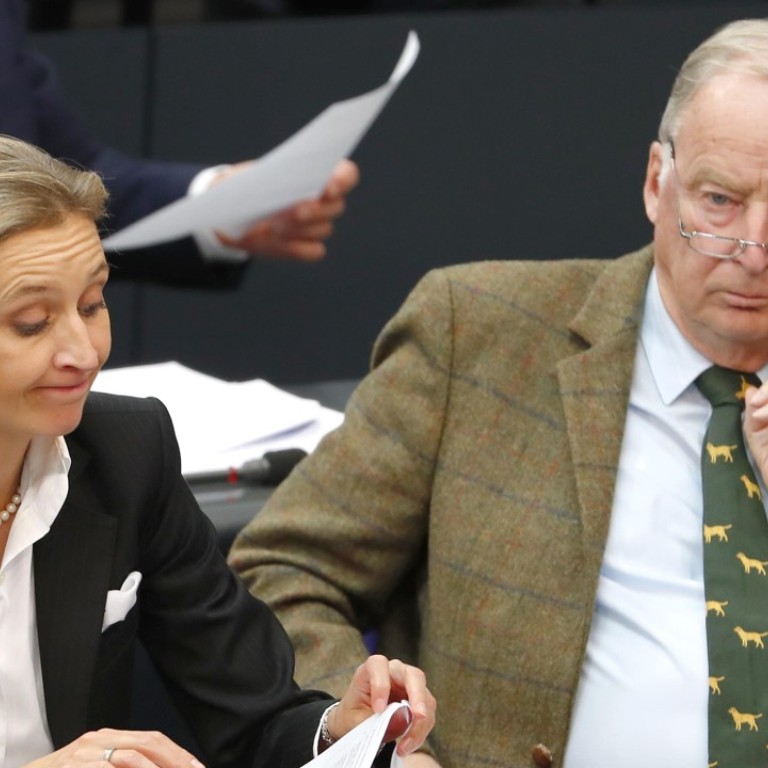
‘A new era begins now’: far-right AfD establish more combative tone as Germany’s new parliament sits
AfD’s leading figures have repeatedly smashed taboos by staking claims to German identity and challenging Germany’s culture of atonement over the second world war and the Holocaust
The far-right AfD party vowed a “new era” as it made its debut on Tuesday at the first sitting of Germany’s newly elected parliament, where it immediately made its disruptive force felt.
Setting the tone of more conflict-driven parliamentary sessions in the next four years, Alternative for Germany (AfD) was first off the mark in filing a motion to challenge a change in parliamentary rules that thwarted one of its lawmakers from making the opening speech in the lower house.
As the motion was immediately defeated by the rest of the lawmakers, the AfD’s parliamentary group chief Bernd Baumann drew a comparison to top Nazi Hermann Goering’s move in 1933 to block communist leader Clara Zetkin from opening the sitting.
The quip drew gasps from the floor and was slammed as “tasteless” by Marco Bueschmann of the liberal FDP party. But that flare-up appeared to be a harbinger of future Bundestag sittings, as the AfD’s leading figures have repeatedly smashed taboos by staking claims to German identity and challenging Germany’s culture of atonement over the second world war and the Holocaust.
“Take note: the old Bundestag has been voted out. The people have decided, a new era begins now,” Baumann said.
Take note: the old Bundestag has been voted out. The people have decided, a new era begins now
“From this hour on, the issues will be renegotiated – not your manoeuvres and tricks on parliamentary business but the euro, massive debt, enormous immigration numbers, open borders and brutal criminality in our streets.”
The AfD’s arrival in the Bundestag is nothing short of a political earthquake in post-war Germany.
Railing against the more than 1 million asylum seekers who have come to Germany since 2015, the Islamophobic party had capitalised on anger among some Germans over the new arrivals.
Ahead of Tuesday’s session, Josef Schuster, the president of the Central Council of Jews in Germany, said the AfD’s presence in parliament gave him a “queasy feeling”.
“It’s a depressing and unsettling feeling to know that there are now people sitting in the Bundestag who appear to want to hide the Nazi past and to target Muslims and asylum seekers,” he told the Juedische Allgemeine, a Jewish publication.
Tuesday’s meeting was meant to have been mostly a housekeeping session, but it turned out far more than procedural.
As polls in the run-up to the September 24 vote predicted that the AfD would win seats, Germany’s mainstream parties tweaked parliamentary rules to block the AfD from getting the symbolic post of interim speaker.
Rather than conferring the role on the oldest MP, it now goes to the lawmaker with the most political experience.
Another battle is also brewing on Tuesday as MPs elect vice-chairs at the Bundestag.
Each party reserves the right to nominate a vice-chair of the lower house, but he or she has to be elected by parliament.
The AfD plans to put forward Albrecht Glaser, who has claimed that the fundamental right to freedom of religion should be withdrawn for Islam.
It’s a depressing and unsettling feeling to know that there are now people sitting in the Bundestag who appear to want to hide the Nazi past
Although mainstream parties have said they would oppose the nominee, the AfD has said that it would nominate Glaser as many times it needs to get him elected.
The dispute risks turning Tuesday’s session into a farce as there is no limit to how many times a party can repeatedly nominate someone.
But beyond the AfD, Chancellor Angela Merkel’s former coalition partner, the venerable Social Democratic Party, also took on a combative tone as it took its seats on the opposition benches.
In the party’s first speech at the house, senior SPD lawmaker Carsten Schneider hit out at Merkel, saying she is “the reason that we have a right-wing populist party here”.
The frontal attack was met with shock by Merkel’s CDU party, with general secretary Peter Tauber condemning it on Twitter, saying “First shenanigans not coming from the AfD, but from the elderly aunt SPD. How low has she sunk!”
Merkel is now scrambling to form a coalition with parties that have opposing views on a string of issues from migration to environmental protection.
Coalition talks with the left-leaning Greens and the FDP began last week.
The potential alliance, which would be a first for Germany at the national level, has been dubbed “Jamaica” because the parties’ black, yellow and green colours match those of the Caribbean country’s flag.

.png?itok=arIb17P0)